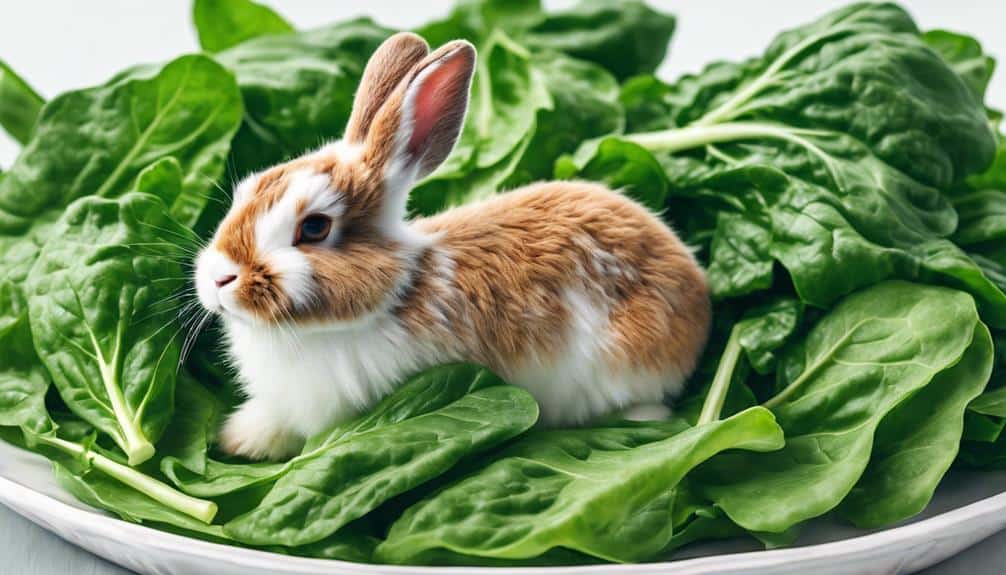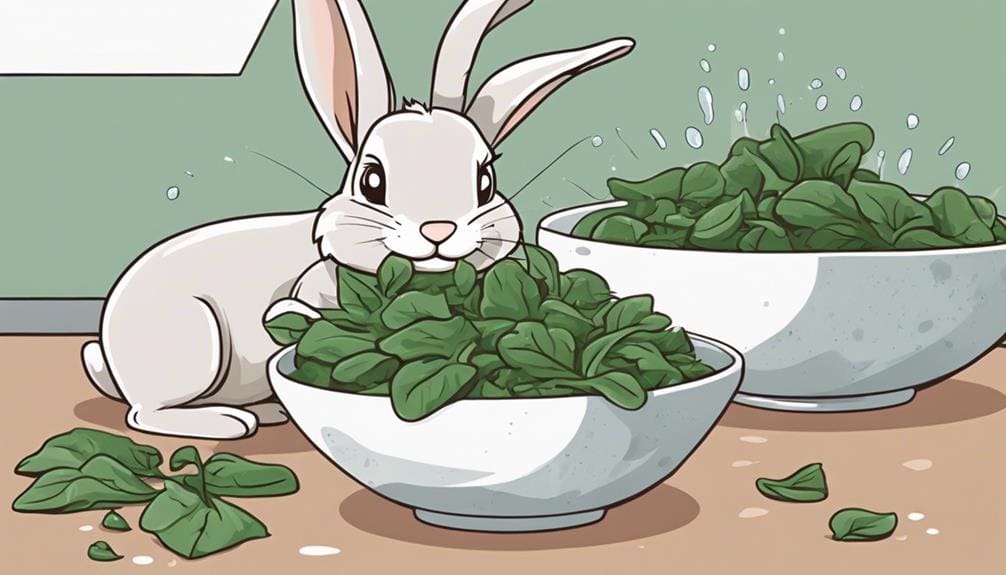Ever wondered if your fluffy companion can indulge in a bit of Popeye's favorite green? While spinach offers a range of nutrients beneficial for bunnies, caution is vital when incorporating it into their diet.
But before you make any dietary decisions for your adorable pet, there are a few essential considerations to keep in mind.
So, let's explore whether bunnies can safely nibble on this leafy delight and uncover the dos and don'ts to guarantee their well-being.
Contents
- 1 Key Takeaways
- 2 Nutritional Benefits of Spinach for Bunnies
- 3 Potential Risks of Feeding Spinach to Bunnies
- 4 How to Safely Introduce Spinach to Bunnies
- 5 Recommended Frequency of Feeding Spinach to Bunnies
- 6 Proper Portions of Spinach for Bunnies
- 7 Monitoring Digestive Health After Feeding Spinach
- 8 Signs of Spinach Allergies in Bunnies
- 9 Consulting a Veterinarian About Spinach in Bunny Diet
- 10 Frequently Asked Questions
- 11 Conclusion
Key Takeaways
- Spinach offers nutritional benefits but should be fed in moderation due to oxalates and high calcium.
- Excessive spinach consumption can lead to digestive issues, kidney problems, and urinary complications.
- Safely introduce spinach by starting with small amounts, monitoring for negative reactions, and rotating with other leafy greens.
- Regular monitoring, veterinary advice, and balanced nutrition are crucial for a bunny's well-being when feeding spinach.
Nutritional Benefits of Spinach for Bunnies

When incorporating spinach into a bunny's diet, it's essential to contemplate the significant nutritional benefits this leafy green vegetable can provide. Rabbits can eat spinach, and it serves as a nutritious vegetable rich in provitamin A, vitamin C, B9, and K1, all of which are essential for maintaining good health in bunnies.
Spinach also contains significant amounts of manganese and calcium, supporting bone health in these small animals. However, due to its high calcium content and oxalates, feeding spinach to bunnies should be done in moderation. It's recommended to offer bunnies a few leaves of spinach no more than every other day to avoid any potential issues with their sensitive digestive systems.
Potential Risks of Feeding Spinach to Bunnies
Feeding spinach to your bunny can pose potential risks such as digestive issues and kidney problems. The oxalic acid in spinach can hinder calcium absorption and lead to urinary complications in rabbits.
Remember to offer spinach in moderation and monitor your bunny for any adverse reactions to prevent health issues.
Digestive Issues
To minimize the risk of digestive issues in bunnies, it's advisable to limit or avoid feeding them spinach due to its potential negative effects on their gastrointestinal health.
When considering feeding rabbits spinach, be cautious of the following:
- Digestive Upset: Excessive consumption of spinach can lead to digestive upset, causing issues like diarrhea or gastrointestinal stasis in bunnies.
- Oxalic Acid Concerns: Spinach contains oxalic acid, which can hinder calcium absorption and potentially lead to bladder sludge or urinary tract problems in rabbits.
- Calcium Binding: Oxalates in spinach may bind with calcium in the gut, possibly contributing to the formation of kidney stones in rabbits.
Remember to monitor your rabbits closely for any signs of discomfort or irregular bowel movements if you choose to introduce spinach into their diet.
Kidney Problems
Consuming spinach in excessive amounts can pose significant risks of kidney problems for bunnies due to the oxalates present in this leafy green vegetable. Oxalates from spinach can contribute to the formation of calcium oxalate crystals in the kidneys, potentially leading to urinary tract issues or kidney failure in rabbits.
Monitoring the inclusion of spinach in a rabbit's diet is important to prevent kidney-related health complications. It's essential to balance a rabbit's intake of fresh vegetables like spinach with other suitable foods to maintain their overall well-being.
If you observe any symptoms indicating kidney problems in your rabbits after feeding them spinach, seeking advice from a veterinarian promptly is recommended to safeguard their health and welfare.
How to Safely Introduce Spinach to Bunnies

When introducing spinach to your bunny's diet, start by offering a small amount of fresh, washed spinach to gauge their reaction and guarantee their tolerance. Follow these steps for a safe introduction:
- Monitor Your Bunny: Watch your rabbit closely after feeding them spinach. Keep an eye on their droppings and overall health to make certain they're handling the new addition well.
- Gradual Increase: Slowly increase the amount of spinach in your bunny's diet over time. Observe for any signs of digestive upset such as diarrhea or reduced appetite.
- Rotate Greens: Rotate spinach with other leafy greens like kale or romaine lettuce to provide a variety of nutrients. This helps prevent overconsumption of oxalic acid found in spinach.
Remember to consult with a veterinarian if you notice any negative reactions or changes in your bunny's health when introducing spinach to their diet. By following these steps, you can safely incorporate spinach into your rabbit's feeding routine while making sure they receive the nutritional value of leafy greens.
Recommended Frequency of Feeding Spinach to Bunnies
When offering spinach to your bunny, it's important to maintain a feeding schedule that limits spinach intake to twice a week to mitigate potential health concerns related to oxalates.
Introduce spinach gradually into your bunny's diet to observe their response. Opt for baby spinach leaves as they're tender and easier for bunnies to chew.
Offering a variety of leafy greens alongside spinach guarantees a well-rounded diet for your bunny, promoting overall rabbit nutrition. Remember that organic spinach is preferable to minimize exposure to contaminants and provide a healthier option for your furry friend.
Proper Portions of Spinach for Bunnies

To guarantee your bunny's well-being, carefully portion out spinach by offering only a few leaves every other day to prevent potential health issues related to oxalates.
When considering the proper portions of spinach for your rabbit's diet, keep in mind the following:
- Moderation is Key: Limit the amount of spinach given to your bunny to avoid overloading them with oxalic acid, which can lead to health problems like kidney stones.
- Introduce Gradually: Start by offering small quantities of spinach and observe how your rabbit's digestive system reacts before incorporating it regularly into their diet.
- Diversify their Diet: Rotate spinach with other safe vegetables to assure a balanced nutrition plan for your bunny and prevent them from developing a preference for one type of food.
Monitoring Digestive Health After Feeding Spinach
After feeding spinach to your bunny, closely monitor their digestive health for any signs of distress or changes in behavior. Spinach contains oxalic acid, which in large amounts can lead to gastrointestinal issues in rabbits. While rabbits can enjoy spinach as part of their daily diet, it is essential to introduce it gradually and in moderation to prevent any potential digestive upsets. Keep an eye on your bunny's droppings for any alterations in consistency or frequency, as well as watch out for signs of bloating, gas, or reduced appetite, which may indicate digestive discomfort. Additionally, observe your rabbit's overall energy levels and behavior to make sure they are not experiencing any adverse effects from the spinach. If you notice any digestive problems or unusual symptoms, consult a veterinarian promptly for guidance. Adjust the amount of spinach given based on your rabbit's digestive response to maintain their digestive health.
| Aspect to Monitor | What to Look For | Action Needed |
|---|---|---|
| Rabbit Droppings | Changes in consistency or frequency | Adjust spinach amount in diet |
| Signs of Distress | Bloating, gas, reduced appetite | Consult veterinarian if needed |
| Energy Levels and Behavior | Unusual behavior or low energy levels | Monitor closely for any changes |
Signs of Spinach Allergies in Bunnies

Watch for signs of spinach allergies in bunnies, which may manifest as skin itchiness, mouth irritation, or digestive upset. If your bunny is experiencing an allergic reaction to spinach, it's important to be aware of the following signs:
- Skin Issues: Keep an eye out for hives, redness, or any other skin abnormalities after your bunny consumes spinach.
- Mouth Irritation: Look for signs of discomfort in the mouth area, such as excessive drooling or pawing at the mouth.
- Digestive Problems: Be vigilant for any digestive disturbances like diarrhea, bloating, or a change in stool consistency.
It is critical to pay attention to your bunny's behavior and physical condition after introducing spinach into their diet. If you notice any of these signs or suspect a spinach allergy, consult a veterinarian promptly. A professional can provide guidance on managing spinach allergies in bunnies and recommend appropriate dietary adjustments to guarantee your furry friend's well-being.
Consulting a Veterinarian About Spinach in Bunny Diet
Before incorporating spinach into your bunny's diet, it's advisable to consult a veterinarian to make sure it meets their specific nutritional requirements. A rabbit-savvy vet can offer guidance on the right amount of spinach to feed your bunny, taking into account factors like age, weight, and overall health.
Seeking advice from a professional can help you understand the potential risks and benefits associated with adding spinach to your bunny's diet. Additionally, a veterinarian can closely monitor your bunny's health and digestion once spinach is introduced to make it's well-tolerated and doesn't lead to any adverse reactions.
Consulting a vet about spinach in your bunny's diet is important in preventing any digestive issues or unwanted side effects. By working with a knowledgeable veterinarian, you can provide the best possible care for your bunny and make sure that their dietary needs are met safely and effectively.
Frequently Asked Questions
Can Rabbits Eat Raw Spinach?
Yes, rabbits can eat raw spinach. It provides essential nutrients like vitamins A, C, and K. However, limit intake due to high oxalic acid content. Introduce gradually, monitor for digestive issues. Wash thoroughly before feeding. Consider alternative greens for variety.
Which Leafy Greens Can Rabbits Eat?
Hey there! When it comes to the best leafy greens for your bunny, focus on safe options like romaine lettuce, kale, and cilantro. Remember, variety is key for ideal nutritional value and don't forget moderation!
What Vegetables Can Rabbits Not Eat?
You shouldn't feed rabbits toxic vegetables like onions, garlic, or leeks. Avoid unsafe foods like beets and carrots due to sugar content. Harmful veggies such as potatoes and corn can lead to digestive issues. Dangerous greens like iceberg lettuce can cause diarrhea.
Can Holland Lops Eat Spinach?
Indulge your Holland Lops with safe greens like spinach to meet their dietary needs. Incorporate leafy vegetables into their bunny diet, ensuring a balanced meal. Remember, variety is key to keeping your Holland Lops healthy and happy.
Conclusion
To sum up, remember that while spinach can offer valuable nutrients to your bunny, too much of a good thing can be harmful.
Just as in life, balance is key. So, sprinkle spinach into your furry friend's diet like a sprinkle of stardust – a little goes a long way.
Keep an eye on their health, consult with a veterinarian if needed, and watch them hop happily through life with a well-rounded diet.






